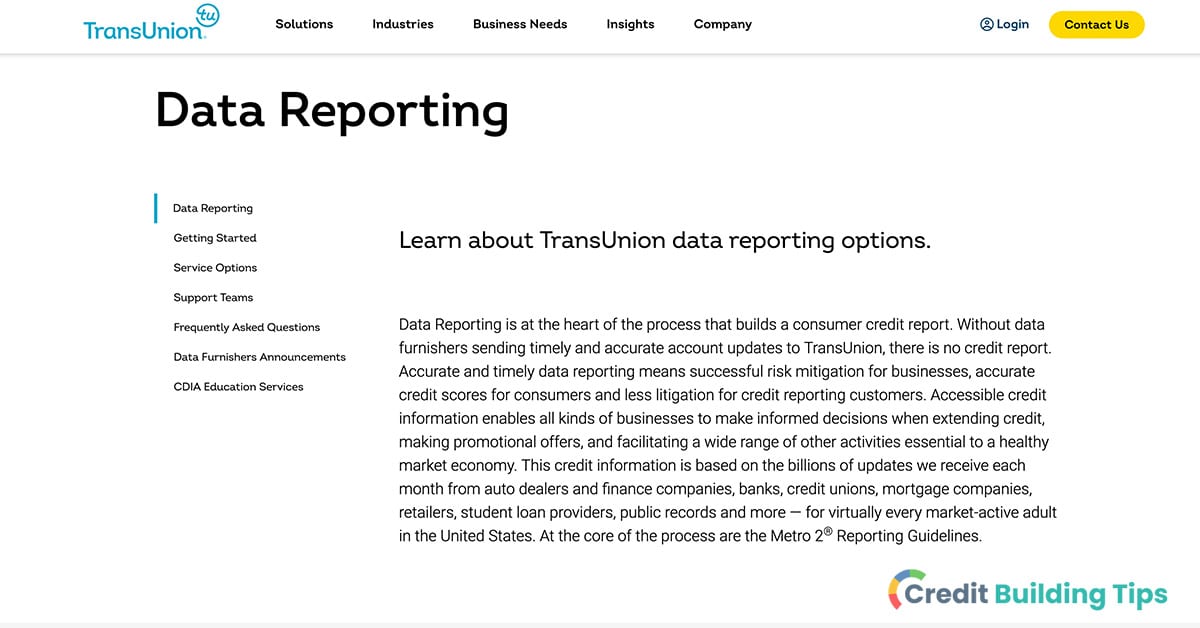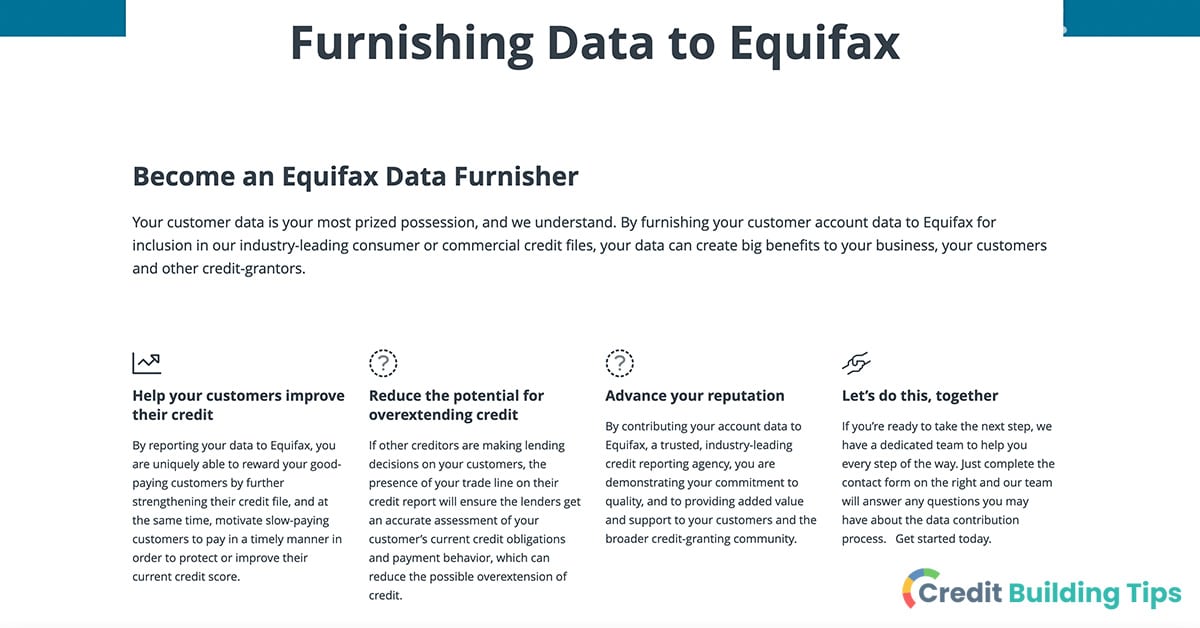If you own a small business and a customer owes you money, you might be wondering whether or not you can report them to the credit bureaus. Even if you don't own a business, you might be curious to know if you have the right to report someone that owes you money to the major credit reporting agencies.
The reality is that reporting to the credit bureaus isn't something you can do in a one-off way. In fact, there really isn't any way that an individual can report to the credit agencies.
 Small business owners that allow customers to pay for things in installments or offer lines of credit, though, can choose to apply to become data furnishers for one or more of the major credit bureaus. As data furnishers, these businesses are required to send accurate information monthly about their consumer accounts. An alternative option is hiring a debt collection agency to try and recoup the debt and report to the credit bureaus.
Small business owners that allow customers to pay for things in installments or offer lines of credit, though, can choose to apply to become data furnishers for one or more of the major credit bureaus. As data furnishers, these businesses are required to send accurate information monthly about their consumer accounts. An alternative option is hiring a debt collection agency to try and recoup the debt and report to the credit bureaus.If you're considering starting to send customer account information to the credit bureaus, stick with us while we go over everything you need to know.
Only officially approved data furnishers can report information to the credit bureaus about a consumer. Individuals aren't authorized to apply to be data furnishers.
Even small businesses, though, can report to the credit bureaus if they are accepted into their data furnisher programs.
If you want to report someone to the credit bureau, you will first need to become an approved data furnisher for the credit reporting agency where you want to send your information.

In order to become a data furnisher, you'll need to:
You can find more information about the specific requirements and application instructions for each credit bureau using the following links:
Once you have been approved as a data furnisher for your selected credit bureaus, you'll want to follow the following steps to report consumer information:
In order to maintain your ability to regularly report consumer information, you'll need to update the required software on a regular basis. Each credit bureau has its own standards that must be maintained in order to continue qualifying as an official data furnisher.
Here are a few additional tips for small businesses that want to report consumer information to the credit bureaus:
If you're not a large lender and aren't interested in becoming a data furnisher with one or more of the major credit bureaus, another option is to hire a collection agency.
Collection agencies are companies that will attempt to collect the debt that you are owed. This can be a reasonable route to take if you only have a few unpaid customer debts.
When choosing a collection agency, you'll want to consider the following:
The three major credit bureaus will not accept information from just any old consumer. If someone owes you money or has been repeatedly late in paying back a private, non-official loan, you're not going to have luck trying to add this information to their credit file.

In order to contribute information to the credit bureaus, you have to become a data furnisher.
Businesses must apply and be accepted as data furnishers at each individual credit reporting agency (or whichever credit bureau they wish to work with) in order to report consumer information. This is not a free service and requires that businesses adhere to and abide by the Fair Credit Reporting Act and all other applicable federal laws.
However, this does mean that small businesses that allow customers to make purchases on credit or pay using installment plans can become data furnishers if they want to make monthly payment reports on their customers.
To become a data furnisher, businesses need to choose the credit bureaus they want to report to and then apply for membership in their business reporting programs. Companies that want to make reports to all three credit bureaus will need to be separately approved by each agency.
Creditors, lenders, and small business owners that offer lines of credit or installment payment plans aren't required to report to credit bureaus by law.
Even though this isn't a requirement, many businesses choose to report information about consumer accounts to the credit bureaus, such as:
It is with this type of information that credit reporting agencies are able to generate consumer credit reports and calculate credit scores.
Other major events will also often be reported to the credit bureaus such as charge-offs and account closures.
You might wonder why businesses and creditors would bother reporting to the credit bureaus, particularly because it is a service that costs them money. There are ultimately a number of reasons why companies might be motivated to become data furnishers, including:
Unfortunately, you are not able to directly report your own financial activity to the credit reporting agencies. Even if you have bills that you regularly pay on time that aren't showing up on your credit report, Equifax, TransUnion, and Experian won't accept information from an individual consumer in this way.
The reason for this is that you have to become a "data furnisher" in order to report information to the major credit bureaus, which is an officially recognized status.
If you own a small business that lets people pay in installments or carry lines of credit, though, it's possible for you to become a data furnisher and report information regarding account payment histories to credit reporting agencies.
There are a number of third-party services you can use as well as services offered by Experian and FICO to add positive information to your credit report. These services will usually require that you turn over private financial and account information.
That being said, there are a number of ways that you can indirectly self-report your own positive financial habits to Experian, Equifax, and TransUnion. There are a number of third-party services you can use, like RentTrack and PayYourRent, which will help you gain positive marks on your credit for on-time rent payments. You can also use Experian Boost to add utility bills and phone bills to your Experian credit report.
Another new service is UltraFICO, which lets you add the balances in your bank account into the mix when calculating your credit score. This can help lenders understand that you have responsibly managed your bank balance (not frequently overdrawing your account) and have cash in your account.
The credit reporting process isn't as straightforward as one might expect, and you can't just report someone to the credit bureau as a regular Joe. To report to the major credit bureaus, businesses and lenders must apply and be accepted as data furnishers.
Yes, landlords and property managers can report information about a tenant's rental payments to the credit bureaus by signing up for a rent reporting service.
All three credit reporting agencies will display rental payment information if they receive it. Of course, landlords and property managers need to be accepted as data furnishers in order to contribute this information.
If your landlord or property manager doesn't report your rent to the credit bureaus, there are a number of reporting services that one can sign up for to have rent contribute to your positive payment history. These include:
Individuals cannot report information to the credit bureaus. Only businesses that have applied and been accepted to the respective data-furnishing programs for credit reporting agencies can send information. There are strict requirements and rules that govern reporting, and data furnishers that don't send regular or accurate reports can have their agreement terminated.
Some credit reporting agencies also maintain credit reports for businesses in addition to consumers. These reports will include the credit accounts owned by a given business, their payment history, the amount owed, any collection activity, and more.
In order to report information regarding another business to the credit bureaus, a company needs to apply and pay for the business credit reporting service at the credit bureau they want to report to. This is a separate service from the consumer credit reporting service.
It's easy to never give much thought to the world of credit reporting until it's something that impacts you directly. After all, the activity of the major credit reporting bureaus can seem pretty out of reach, and understanding how and why our credit reports look as they do can feel cryptic, to say the least.
Having negative information on your own credit report can be pretty frustrating, but it's natural for your tune to change once someone owes you money for an unpaid debt. You might wonder if you can report them to the credit bureau and, if so, how.
The truth is individuals can't report to credit bureaus, only businesses. Even then, there is a cost to doing so and a number of requirements that must be met in order to qualify as a data furnisher. Another option on the table is hiring a collection agency, but you'll want to weigh out the pros and cons before going this route.
Whether or not you decide it's worth it to become a data furnisher, there is always value in better understanding the credit reporting process. As business owners and consumers, credit files and scores can have a major impact on our financial opportunities. When it comes to your credit, knowledge is power!
For more resources about building credit and understanding the world of credit reporting, make sure you check out our Credit Building Tips blog.